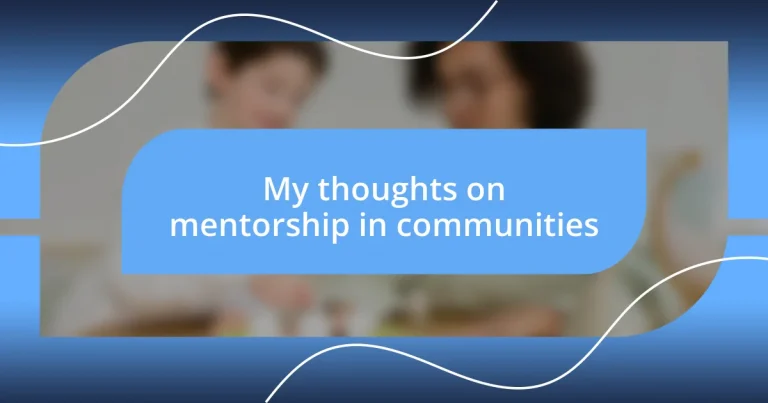Key takeaways:
- Mentorship fosters mutual growth, enhancing skills and perspectives for both mentors and mentees while creating a ripple effect of support within the community.
- Effective mentors exhibit empathy, adaptability, and a commitment to lifelong learning, which builds trust and encourages personal development in mentees.
- Building a mentorship culture requires open communication, recognition of achievements, and collaborative networks to maximize learning opportunities and strengthen community bonds.
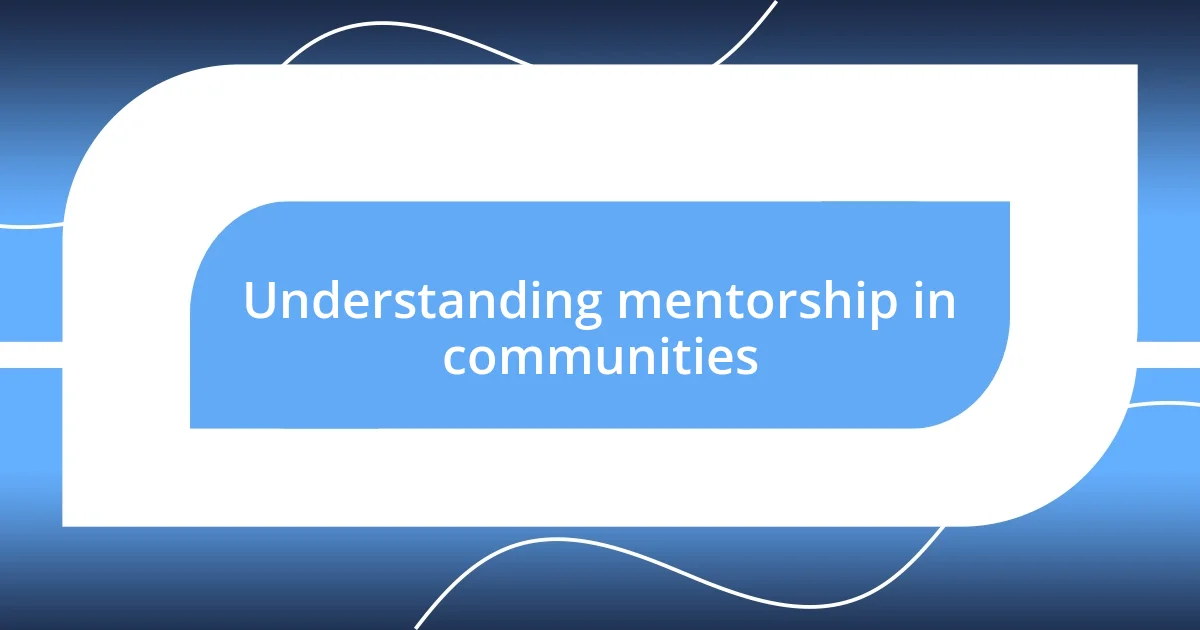
Understanding mentorship in communities
Mentorship in communities often brings about a transformative energy that benefits everyone involved. I remember when I first became a mentor; seeing my mentee’s progress felt deeply rewarding. It made me realize how powerful this exchange can be—not just for the mentee, but for the mentor too. Have you ever considered how mentoring can shape your own perspective?
When mentors and mentees engage, learning becomes a two-way street. I’ve had mentors who challenged my ideas, pushing me outside my comfort zone. That discomfort led to growth in ways I didn’t anticipate. Isn’t it fascinating how mentorship can lead to such unexpected insights?
Moreover, the impact of mentorship reaches far beyond individual relationships. In my community, I’ve seen mentorship create a ripple effect, inspiring others to step up and contribute. It’s like planting seeds that grow into a forest of collaboration and support. How can we foster more of these connections in our lives? The answer lies in actively listening and genuinely investing in one another’s growth.
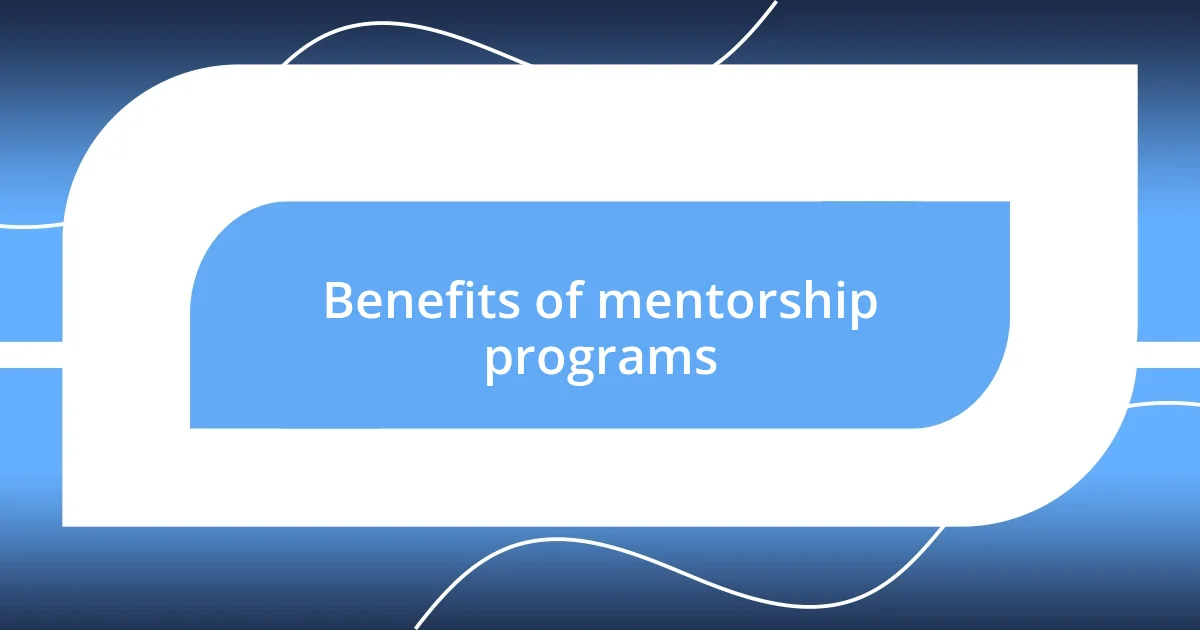
Benefits of mentorship programs
Mentorship programs offer a myriad of benefits that often extend beyond what participants initially expect. From my experience, one of the most significant advantages is the sense of community and belonging that blossoms within such programs. I’ve witnessed individuals, once hesitant to connect, forge lasting friendships through shared goals and experiences, turning strangers into staunch allies.
Here are some impactful benefits of mentorship programs:
- Skill Development: Mentees gain practical skills and insights that are crucial for their personal and professional growth.
- Networking Opportunities: Participants expand their professional networks, creating pathways to new career opportunities.
- Increased Confidence: Mentees often report a boost in self-esteem, leading to greater initiative in pursuing their ambitions.
- Supportive Environment: The program fosters a safe space for sharing challenges, encouraging honest dialogue and mutual support.
- Legacy Building: Mentorship contributes to the legacy of knowledge transfer, ensuring that valuable insights are passed on to future generations.
In my view, these interactions don’t just empower mentees; they also revitalized my passion for sharing knowledge. I fondly recall a mentee who was once uncertain about their career path. After a few months of working together, their transformation was stunning—like watching a flower bloom. That journey reminded me of the profound impact we can have on one another’s lives.
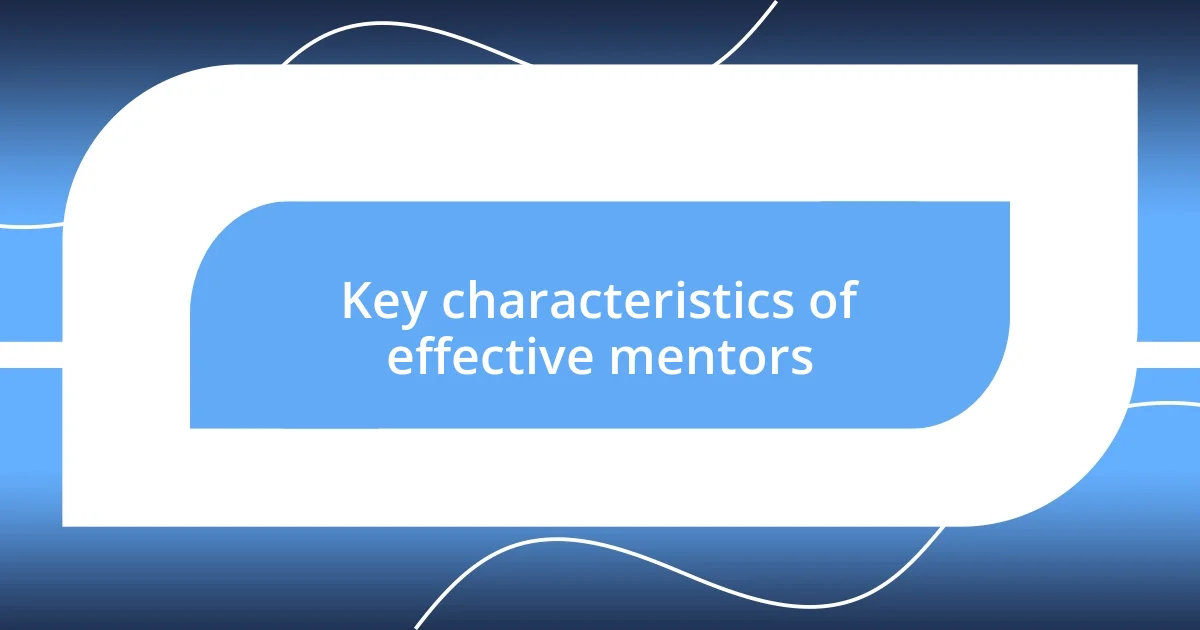
Key characteristics of effective mentors
Effective mentors possess distinct characteristics that can significantly influence the mentoring relationship. One key trait is empathy. From my experience, being able to genuinely understand and share the feelings of a mentee creates a safe environment for them to express their fears and aspirations. I recall a situation where a mentee confided in me about their self-doubt. My empathetic response helped them uncover solutions together, fostering trust and openness.
Another fundamental quality is adaptability. Every mentee brings their unique background and challenges, requiring a mentor to be flexible in their approach. For instance, I once mentored someone with a vastly different learning style than mine. By adapting my methods, I was able to connect with them effectively, leading to breakthroughs that we celebrated together. It reinforced my belief that effective mentorship is about meeting mentees where they are, not where we expect them to be.
Lastly, a strong commitment to lifelong learning sets effective mentors apart. I believe mentors should continuously seek knowledge and experiences, inspiring mentees to do the same. In my journey, I’ve attended workshops and conferences, often returning with fresh insights that rejuvenate my mentoring approach. This ongoing commitment to growth not only enhances our relationship but also models the importance of constant improvement for my mentees.
| Characteristic | Description |
|---|---|
| Empathy | Ability to understand and share feelings with mentees, fostering trust and openness. |
| Adaptability | The flexibility to adjust mentoring styles to suit the unique needs of each mentee. |
| Lifelong Learning | A mentor’s commitment to continuous growth that inspires mentees to embrace their own learning journey. |
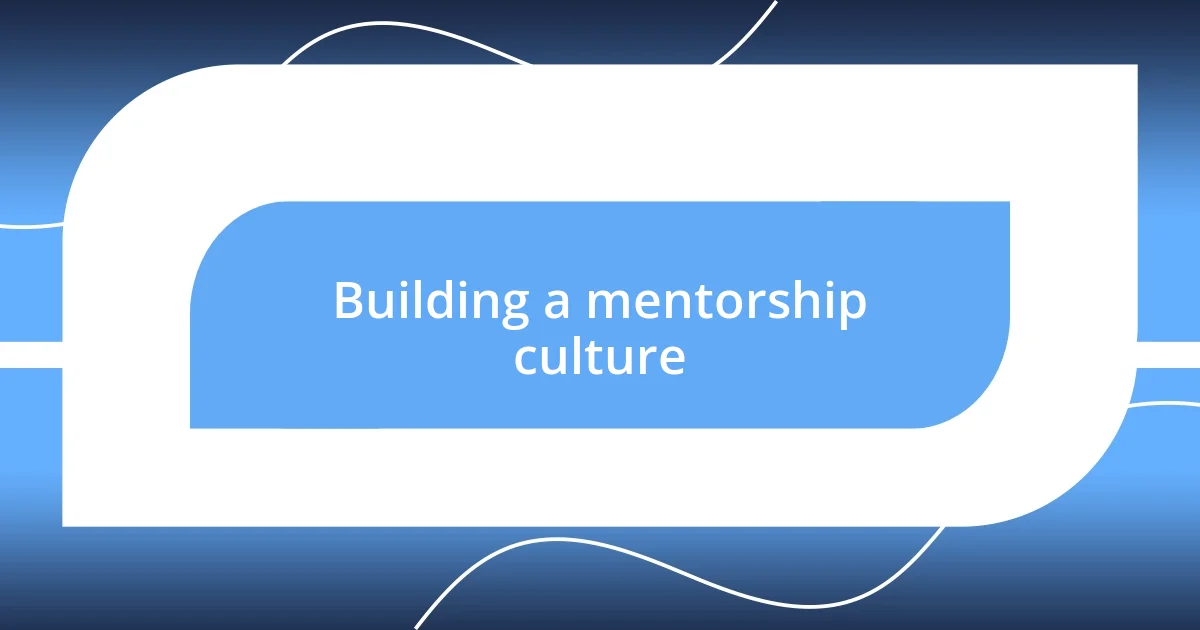
Building a mentorship culture
Creating a mentorship culture really starts with fostering an atmosphere of openness. I’ve found that when mentors openly share their own journeys, their failures, and successes, it encourages mentees to do the same. Do you remember a time when vulnerability led to a breakthrough? I do—during one of my mentorship sessions, I shared a significant setback I faced early in my career. That admission broke the ice, and it was like setting off a chain reaction. My mentee began to share their own struggles, and together we crafted a plan to turn those challenges into stepping stones.
Encouraging collaboration among mentors and mentees is equally vital. This isn’t just a one-on-one relationship; it thrives when we create networks where participants can bounce ideas off each other. I remember initiating group discussions in our mentorship program, and the dynamic was electric. It was amazing to witness individuals who hadn’t spoken to each other before suddenly igniting conversations and sharing resources. It made me reflect: how often do we miss learning opportunities by not tapping into the collective wisdom around us? I realized that a strong mentorship culture isn’t just about individual growth but also about community learning.
Lastly, recognition plays an essential role in building a mentorship culture. Celebrating the achievements, big or small, of both mentors and mentees can energize the community. I’ve hosted small appreciation events where we acknowledge progress made, which has had a downright infectious effect on morale. People leave these gatherings feeling valued and motivated to continue their journeys. It makes me wonder—how would you feel if your efforts were consistently recognized? I believe that small gestures of appreciation can go a long way in solidifying a supportive and thriving mentorship environment.
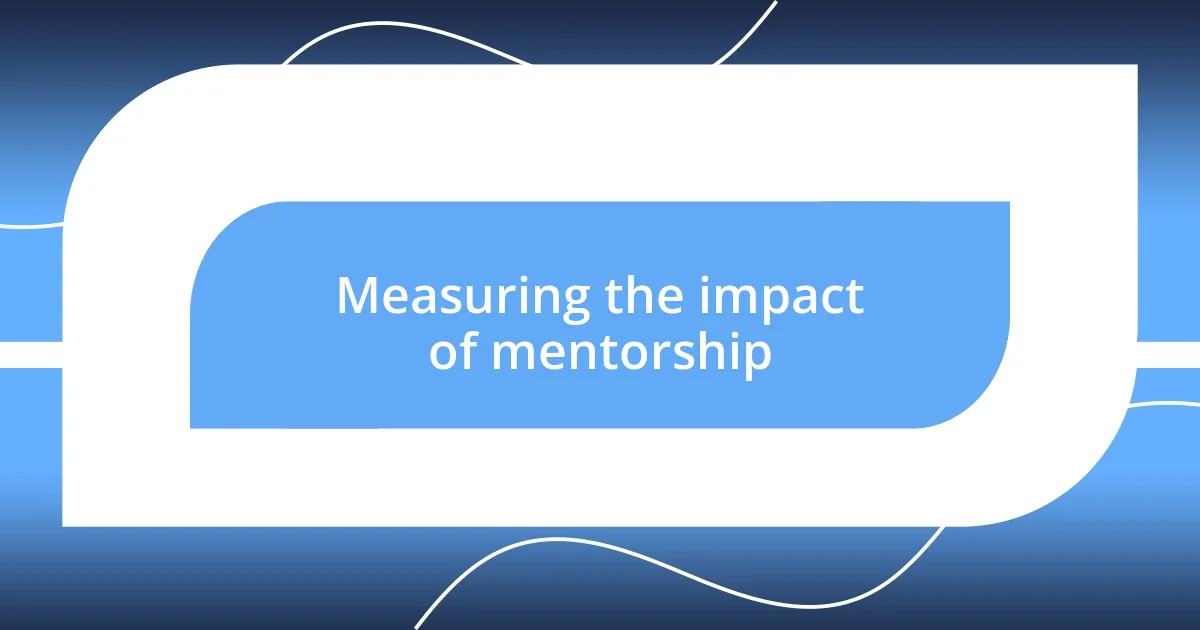
Measuring the impact of mentorship
Measuring the impact of mentorship is often a nuanced task. One way I gauge this impact is by observing changes in a mentee’s confidence and skills over time. For instance, I remember a mentee who initially struggled to voice their ideas in group settings. After several sessions of encouragement and constructive feedback, they not only participated actively but led discussions, transforming their uncertainty into self-assuredness. How gratifying it is to witness such transformation in real time!
Another method involves soliciting feedback directly from mentees. I’ve found that conducting informal surveys can reveal unexpected insights into the mentoring process. One time, a mentee shared how my guidance on setting goals wasn’t just valuable in our sessions but also directly applied to their academic life. It reminded me that mentorship extends beyond our conversations—its impact ripples through multiple aspects of a person’s journey.
Lastly, tracking long-term growth metrics—such as promotions, academic achievements, or new skills—is essential to understanding mentorship’s effectiveness. I recall a mentee who, after securing a new role thanks to our work together, reached out to share how our sessions had influenced their career trajectory. It reaffirmed my belief: recognizing tangible outcomes can solidify the value of mentorship in a community. These experiences, both big and small, shape how I perceive my role as a mentor and highlight the true impact of our efforts.
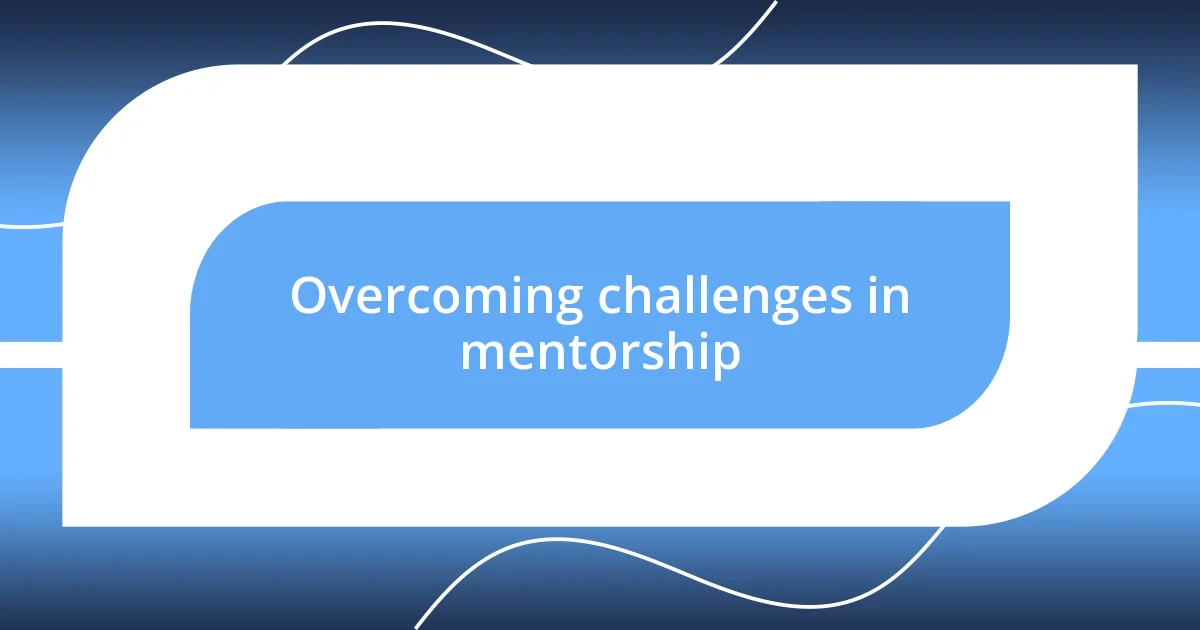
Overcoming challenges in mentorship
Navigating challenges in mentorship can be daunting, but I’ve learned that open communication is a powerful tool. In my experience, when obstacles arise—be it mismatched expectations or communication gaps—addressing them head-on often leads to remarkable breakthroughs. I remember a particularly tense moment with a mentee who felt overwhelmed by their responsibilities. Instead of sidestepping the issue, I invited them to share their thoughts openly, which led to a deeper understanding of their needs. Have you ever had a moment like this where honesty transformed the situation?
Time constraints can also pose significant hurdles in mentorship. I’ve faced this challenge during busy seasons when both mentors and mentees juggle multiple obligations. What works for me is carving out dedicated “mentorship time,” even if it’s just 30 minutes a week. This structured approach not only helps maintain consistency but also creates a sense of accountability. I often reflect on how the small, yet regular interactions can foster relationship growth. It makes me wonder—what if we all committed just a little time weekly to mentorship?
Finally, recognizing cultural and personal differences is paramount in overcoming mentorship challenges. I once mentored someone from a vastly different background, and our initial conversations were sometimes awkward. I took a step back and committed to understanding their perspective, which ultimately enriched our discussions. This experience taught me the importance of empathy in mentorship. Have you ever realized that by embracing our differences, we can create a more supportive and effective mentorship relationship? It’s moments like these that remind me of the profound impact mentorship can have when we embrace our diverse experiences.












